* You are viewing Posts Tagged ‘Networks’
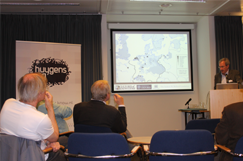
Project Director Howard Hotson opens our talk with some Hartlibian background.
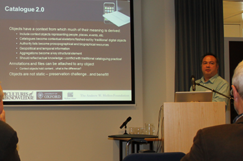
Our technical lead Neil Jefferies describes 'Catalogue 2.0'.
Last week provided us with another opportunity to share the Project, specifically its union catalogue and associated editorial tools, at the international conference Representing the Republic of Letters (The Hague, 30 June–1 July 2011). Organised by our partners and good friends CKCC in the congenial surroundings of the recently renamed Huygens ING, and held in conjunction with the Descartes Centre at Utrecht University, the event showcased the fascinating work being undertaken by various individuals and projects worldwide to represent early modern correspondence networks and their constituent components digitally and visually. General sessions devoted to funding and standards facilitated ongoing collaborative discussions between CofK, our hosts, and Mapping the Republic of Letters (Stanford), who also presented at the event.
James Brown
July 04, 2011
Events, Lectures, Project Updates
Tags: Astronomy, Europe, History of Science, John Wallis, Mathematics, Networks, Oxford, Royal Society, Seventeenth Century
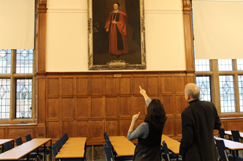
Kneller's 1699 portrait of Wallis in situ.
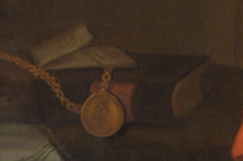
A telling epistolary detail.
In the eighth and final paper of our second seminar series on Thursday 23 June, our very own Dr Philip Beeley (University of Oxford) brought proceedings to a strong finish with a paper entitled ‘Oxford Science and the Republic of Letters: The Correspondence Networks of John Wallis’. Drawing on his intensive research on Wallis’s letters – two hard-copy editions of which he is preparing for publication with the support of the Project – Beeley argued that, in the absence of direct patronage, Wallis’s 246 individual correspondences enabled the mathematician, cryptographer, and (from 1649) Savilian Professor of Geometry to establish a name for himself within the broader European Republic of Letters. Indeed, the importance of epistolarity to Wallis is iconographically symbolised by the prominence of an opened letter in Kneller’s 1699 portrait of him (pictured), which now hangs in the University’s Examination Schools. Focussing on case studies, Philip used Wallis’s harmonious communications with the Danzig astronomer Johannes Hevelius to show how epistolary exchanges between distant friends could facilitate the kind of productive intellectual commerce and collaboration idealized by Comenius, Hartlib, and (in the context of the early Royal Society) Henry Oldenburg. However, switching his focus to Wallis’s more turbulent astronomical entanglements with the Dutch mathematicians Christiaan Huygens and Frans van Schooten, Beeley reminded us that the Republic of Letters was far from a gentleman’s club, and that interpersonal rivalries, methodological disuputes, accusations of plagiarism, and the quest for success and status remained powerful influences on scientific discussion throughout the second half of the seventeenth century. Questions focused on letters, mathematical pedagogy, and disciplinary formation; the importance of the patronage of Mary Vere during the first part of Wallis’s career; and unwritten codes of conduct and behaviour within the Republic of Letters. For past lectures in the series, please see the seminar webpage; details of the 2011 series will be available shortly.
 Podcast now available on the seminar page!
Podcast now available on the seminar page!
James Brown
June 26, 2011
Events, Lectures, Project Updates
Tags: Databases, Eighteenth Century, Hans Sloane, History of Medicine, History of Science, Networks, Seventeenth Century, Visualization
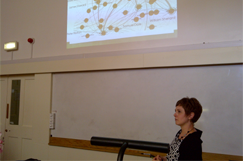
Dr Smith during her talk.
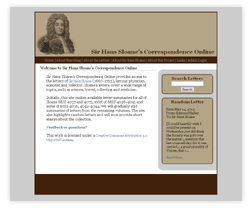
For the seventh and penultimate paper of our seminar series on Thursday 16 June, Dr Lisa Smith (University of Saskatchewan) described her recent efforts towards ‘Visualizing Hans Sloane’s Early Correspondence Networks’. Despite neglect in the historiographies of medicine and science, Smith described Sloane as a facilitator or ‘supermediator’ central to the activities of the early Royal Society as well as the lives of his patients, who corresponded voluminously despite his small number of formal publications. Indeed, Smith is in the process constructing a relational database of Sloane’s many letters – Sir Hans Sloane’s Correspondence Online – which she demonstrated during the talk, and which provided the raw data for the network visualizations. Emphasising that the resource is a work in progress (although an impressive 1,641 letters have been catalogued so far), Smith described the ‘back’ and ‘front’ ends of the catalogue – like our own digital resource, a sophisticated editorial interface sits beneath the search and browse functions – which allows users to explore and filter the Sloane corpus by a full range of standard epistolary metadata as well as a variety of medical themes and keywords, both contemporary and modern. Transcriptions are also being made available, while digital images of the original manuscripts are also in the pipeline. In the second half of her talk, Smith used visualizations of the data created with the recent Yifan Fu algorithm to explore several of the most interesting networks revealed by the correspondence; a surprisingly continental set of relationships, in which connections of patronage, marriage, and friendship loom large. Smith concluded by arguing that network visualizations derived from large datasets are vital in revealing intricacies and overlaps between groups of individuals which would not otherwise have been perceivable, and are of special value in highlighting clusters of relationships (or networks within networks) which can then be reconstructed in more detail. Seminars take place in the Faculty of History on George Street on Thursdays at 3pm. For future talks in the series, please see the seminar webpage.
 Podcast now available on the seminar page!
Podcast now available on the seminar page!
James Brown
June 09, 2011
Events, Lectures, Project Updates
Tags: Archives, Communication, England, Materiality, Networks, Politics, Religion, Scribal Copies, Seventeenth Century, Sixteenth Century
 In the fifth paper of our seminar series on Thursday 2 June, Professor James Daybell (University of Plymouth) delivered a fascinating paper entitled ‘The Scribal Circulation of Early Modern Letters’. Debuting material from his forthcoming book on the materiality of the letter, and in a slight change from the advertised title, Daybell provided a sophisticated overview of the ‘complex textual afterlives’ of letters beyond their initial composition, sending, and receipt; a conceptualization which challenges prevailing views of early modern epistolarity as a private, historically anchored exchange between only two individuals. By means of a rich range of political and religious examples from early modern England, Daybell traced several consecutive phases of subsequent manuscript dissemination: the controlled circulation of epistolary separates through private copying within discrete manuscript networks; a less discriminate casting abroad; commercial scribal publication within anthologies and miscellanies (in which copies of letters co-mingled with verse, libels, prose, and other manuscript genres); and finally, in many cases, print publication. Daybell also provided insights into the postal conditions which facilitated scribal transmission in early modern England, a surprisingly makeshift mixture of different delivery methods (ordinary posts, royal posts, messengers, carriers, servants, and chance travellers) until the introduction of a more stable and predictable postal structure with the founding of the post office in 1635. Questions focussed on the role of London and the universities as entrepôts for scribal dissemination; the costs of delivery; the anxieties and self-censorship engendered by the instability and porosity of the early modern postal network; and the distinction between ordinary street copies and scribal separates produced by commercial scriptoria. Seminars take place in the Faculty of History on George Street on Thursdays at 3pm. For future talks in the series, please see the seminar webpage.
In the fifth paper of our seminar series on Thursday 2 June, Professor James Daybell (University of Plymouth) delivered a fascinating paper entitled ‘The Scribal Circulation of Early Modern Letters’. Debuting material from his forthcoming book on the materiality of the letter, and in a slight change from the advertised title, Daybell provided a sophisticated overview of the ‘complex textual afterlives’ of letters beyond their initial composition, sending, and receipt; a conceptualization which challenges prevailing views of early modern epistolarity as a private, historically anchored exchange between only two individuals. By means of a rich range of political and religious examples from early modern England, Daybell traced several consecutive phases of subsequent manuscript dissemination: the controlled circulation of epistolary separates through private copying within discrete manuscript networks; a less discriminate casting abroad; commercial scribal publication within anthologies and miscellanies (in which copies of letters co-mingled with verse, libels, prose, and other manuscript genres); and finally, in many cases, print publication. Daybell also provided insights into the postal conditions which facilitated scribal transmission in early modern England, a surprisingly makeshift mixture of different delivery methods (ordinary posts, royal posts, messengers, carriers, servants, and chance travellers) until the introduction of a more stable and predictable postal structure with the founding of the post office in 1635. Questions focussed on the role of London and the universities as entrepôts for scribal dissemination; the costs of delivery; the anxieties and self-censorship engendered by the instability and porosity of the early modern postal network; and the distinction between ordinary street copies and scribal separates produced by commercial scriptoria. Seminars take place in the Faculty of History on George Street on Thursdays at 3pm. For future talks in the series, please see the seminar webpage.
 Podcast now available on the seminar page!
Podcast now available on the seminar page!
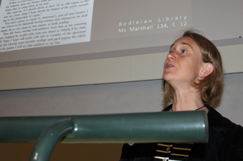
Dr van Romburgh during her talk.
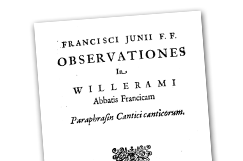
Junius's 'Observationes' from 1655.
In the fourth paper of our seminar series on Thursday 26 May, Dr Sophie van Romburgh (University of Leiden) spoke about ‘Reciprocal Bonds Between Words and Friends, or Correspondence According to Francis Junius’. In a poetic and suggestive analysis, van Romburgh outlined a new framework for appreciating the correspondence of the seventeenth-century philologist, which she edited in 2002, by turning to the closely related genre of commentary (the etymological elucidations of words and concepts in early modern source texts). Van Romburgh argued for a comparable set of ‘discursive dynamics’ between commentary and learned correspondence, and suggested that both attempted to add ‘lustre’ to objective, impersonal, abstract knowledge by embedding it within lived experience and wider networks of words, scholars, and friends. Not only does the thematic eclecticism and ‘easy mix’ of classical, biblical, and contemporary voices evident in Junius’s commentaries evoke the lively, promiscuous character of intellectual correspondence, but they also combine serious etymological pursuit with personal anecdote (especially evident in his ‘Observationes’ from 1655). This connects the ‘formal grid’ of the dictionary or source text with broader ‘constellations of knowledge and people’, relating the exotic and the arcane to the familiar and the experiential, and providing an example of early modern ‘associative rhetoric’ (Roberta Frank) in action. Junius’s commentaries also reference extra-textual conversations with scholar-friends, as do his letters; a powerful reminder that both commentary and correspondence existed within a voice-oriented culture (or ‘oral story world’), and superimposed a ‘vast, living world of spoken communication, of which only some glimpses make it to paper’. Cultures of Knowledge, argued van Romburgh, are created within this vast multi-dimensional space, and out of the lived practices of networks of scholar-friends (‘the ecology of early modern scholarship’). Questions focussed on national differences in discursive and communicative cultures; the social and political, as well as the discursive and intellectual, logic of early modern annotations; the pedagogical origins of associational thinking; and the very different historiographical trajectories described by the history of science and the history of scholarship. Seminars take place in the Faculty of History on George Street on Thursdays at 3pm. For future talks in the series, please see the seminar webpage.
 Podcast now available on the seminar page!
Podcast now available on the seminar page!
James Brown
May 16, 2011
Events, Lectures, Project Updates
Tags: Databases, Editions, Eighteenth Century, Gottfried Wilhelm Leibniz, History of Philosophy, Mathematics, Networks, Seventeenth Century
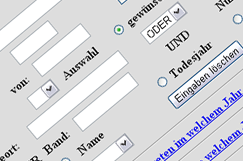
Visit Leibniz correspondence database.
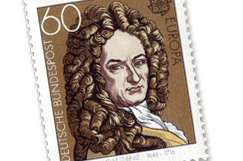
Leibniz depicted on a 1980 stamp.
In the second paper of our seminar series on Thursday 12 May, Dr Nora Gädeke (Gottfried Wilhelm Leibniz Bibliothek) provided us with a privileged insight into ‘Work in Progress: Leibniz’s Correspondence Network’, currently being reconstructed by the Akademie-Ausgabe edition, a group of collaborators in Potsdam, Münster, Hannover, and Berlin, under the aegis of the Academies of Science of Göttingen and Berlin-Brandenburg. In a detailed and reflexive analysis, Gädeke outlined the epistolary activities and contacts of this prolific correspondent, whose surviving letters number c.15,000-20,000, and who saw letter-writing as ‘one of the main characteristics of his life’. She also described the editorial principles and strategies of the definitive, multi-volume Akademie-Ausgabe edition, which include reproducing all items of Leibniz’s corpus chronologically and topically (including all extant copies), as well as the creation of a full critical apparatus. Further, she discussed the practical and conceptual challenges posed by such an ambitious, ‘cinematic’ enterprise. Gädeke concluded her talk, and introduced the question and answer session, by demonstrating the public database of Leibniz’s correspondence, one of a series of innovative online tools developed by the project to facilitate editorial work on the hard-copy volumes and disseminate some key findings beyond the edition itself. Discussion focused on a range of topics, including: the role of patronage in Leibniz’s network; information as a form of ‘social capital’ in early modern Europe; the importance of superimposing places in which letters were sent or received with geopolitical subtleties; Leibniz’s approach to storing and ordering his letters; his motivations for keeping them in the first place; and the key role online databases can play in supporting and publicizing conventional scholarly work on major corpora. Seminars take place in the Faculty of History on George Street on Thursdays at 3pm. For future talks in the series, please see the seminar webpage.
 Podcast now available on the seminar page!
Podcast now available on the seminar page!







 In the fifth paper of our
In the fifth paper of our 




 Join
Join 